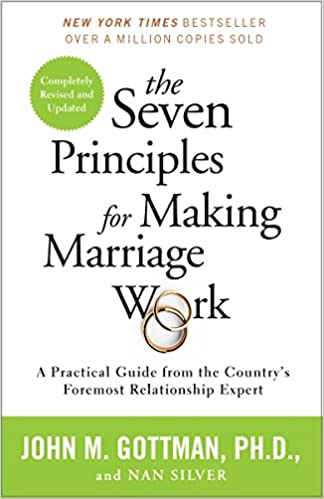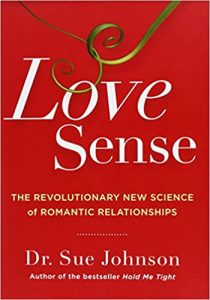Listen to this episode of the Focus with Marlene Podcast
Get caught up with all episodes in the “Make Stress Work for You” series
Everything was going so nicely, and then life stepped in. There’s not enough money to pay the bills, the credit card debts are piling up, in-laws intrude with too many visits or too much advice, to keep my job I have to work longer hours and accomplish more.
Suddenly we find ourselves arguing more – tempers flare, anger rises beyond the norm, and the blame game begins. We go outside our marriage to talk about our spouses and get consolation, validation, sympathy, and support.
And the scene is set for more serious troubles.
 In his book, The Seven Principles for Making Marriage Work, Dr. John Gottman lays out in a practical format the seven principles for making marriage work, based on years of research and study in his Seattle based clinic, The Gottman Institute.
In his book, The Seven Principles for Making Marriage Work, Dr. John Gottman lays out in a practical format the seven principles for making marriage work, based on years of research and study in his Seattle based clinic, The Gottman Institute.
It is a book I highly recommend to anyone interested in developing an even more “harmonious and long-lasting relationship” with their spouse. The exercises as well as the information presented are easy to follow and exceptional.
The danger zone
When you become negative and sarcastic, you are venturing on the threshold of a danger zone. It is not just anger, but it is a simmering, ongoing dislike and rage. It is not just arguing or fighting – it is developing contempt for your partner.
Gottman describes four areas of negative interaction that precipitates the early demise of a marriage. He refers to these areas as the “Four Horsemen of the Apocalypse: Criticism, Contempt, Defensiveness and Stonewalling.
Do you recognize any of these four horsemen in your relationship?
1. Criticism:
These are words that denigrate or belittle the character or personality of your spouse. It goes beyond complaints which target behaviors. It belittles and scorns and vilifies.
2. Contempt:
An attitude of disgust, sarcasm and cynicism is built. You now consider your spouse either worthless or inferior and not worthy of respect. Whatever your spouse says or does, your response is to mock or sneer at them. This is an extremely toxic brew that you have allowed to ferment and develop.
3. Defensiveness:
Because you have allowed negative thoughts about your spouse to simmer and stew without resolution, no matter what your spouse says, it is immediately construed as an attack. You are constantly on the defensive and ready to counter-attack and blame your spouse for anything and everything that happens, putting a negative spin on even the slightest indiscretion, lack of judgment or tact. There is no problem-solving or negotiation – just attack and defend.
4. Stonewalling:
As this destructive cycle continues, individuals caught in its sequence begin to stonewall, refusing to cooperate, avoiding questions and deliberately creating delays. Their persona indicates they could care less what the other person says or does. They are no longer interested in discussion, negotiation or resolving disagreements.
“The truth is rarely pure and never simple.”
—Oscar Wilde
Is there any hope?
While these may be predictive signs of a potential breakup, when two people really want to change and work together, they can do so. Sometimes we think if we just leave and start over again our lives will be different and we will be happy. We forget, however, that we take with us the remnants of previous broken relationships and unless we work through them, we repeat previous behaviors.
Dr. Sue Johnson, clinical psychologist, and creator of Emotionally Focused Therapy (EFT) for couples, has found three key factors relationships need in order to be truly healthy. As they argue and battle, she believes in the back of all these battles, what they are asking is the following: “Are you there for me?”
She postulates the following three things that are needed to be present in order to receive a “Yes” to this question.
Known as A.R.E., these are Accessibility, Responsiveness, and Emotional Engagement.
Accessibility:
When people feel their partner is accessible in some way to them, they feel more secure, less anxious and validated. To become accessible, pay attention to what your partner is sensitive to. Instead of immediately continuing a fight, stop and extend an olive branch instead. Listen – really listen. Validate how your partner is feeling.
Responsiveness:
When your partner comes to you, respond – be there – let them know you are there for them. This is especially important when you are in the middle of something. Let them know you sincerely want to talk and set a time when you can come together and have a discussion.
Emotional Engagement:
 “Love is really an emotional bond more than anything else,” says Dr. Johnson.
“Love is really an emotional bond more than anything else,” says Dr. Johnson.
In her book, Love Sense: The Revolutionary New Science of Romantic Relationships, she writes that research is increasing our understanding of emotions and how they apply in neuroscience, psychology, and biology and how important it is to “care about your partner’s emotional experience.”
Let them know you care. “The more emotionally engaged partners are with each other, the stronger their bond.”
Next time you find yourself fighting, stop, take a deep breath, and ask yourself what you are really fighting about.
What is really important?
Do you want to turn your stress into a positive force?
 My Make Stress Work for You bundle will help you:
My Make Stress Work for You bundle will help you:
- Identify the personal stressors that create high levels of distress in your life
- Learn how to identify problems and find ways to solve them
- Replace unhelpful thinking with constructive and practical ways to lower levels of fear, worry, and anxiety
The book bundle includes:
- ebook
- audio recording of each chapter’
- companion Study Guide & Personal Application Workbook
- Four bonus guides
Click here for details and to order

